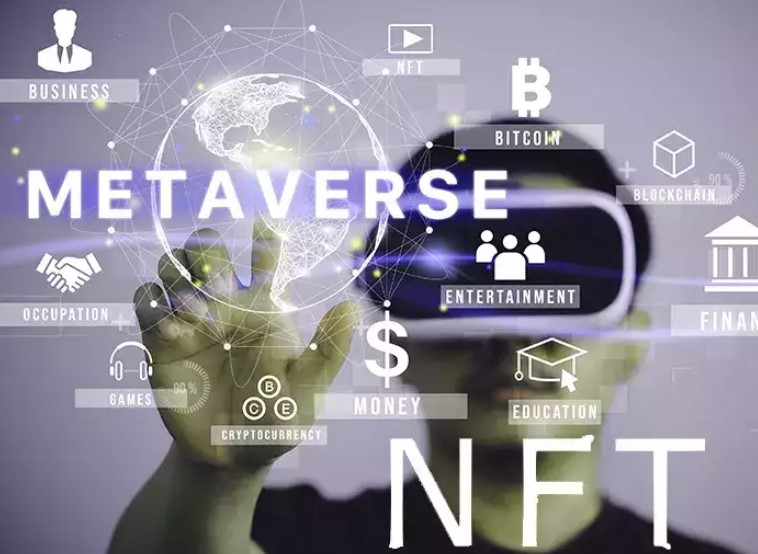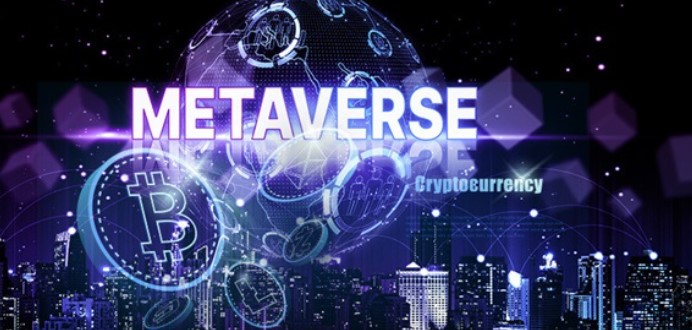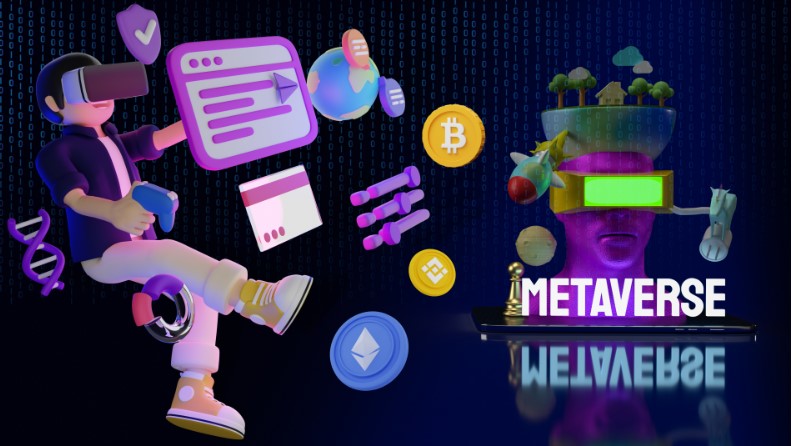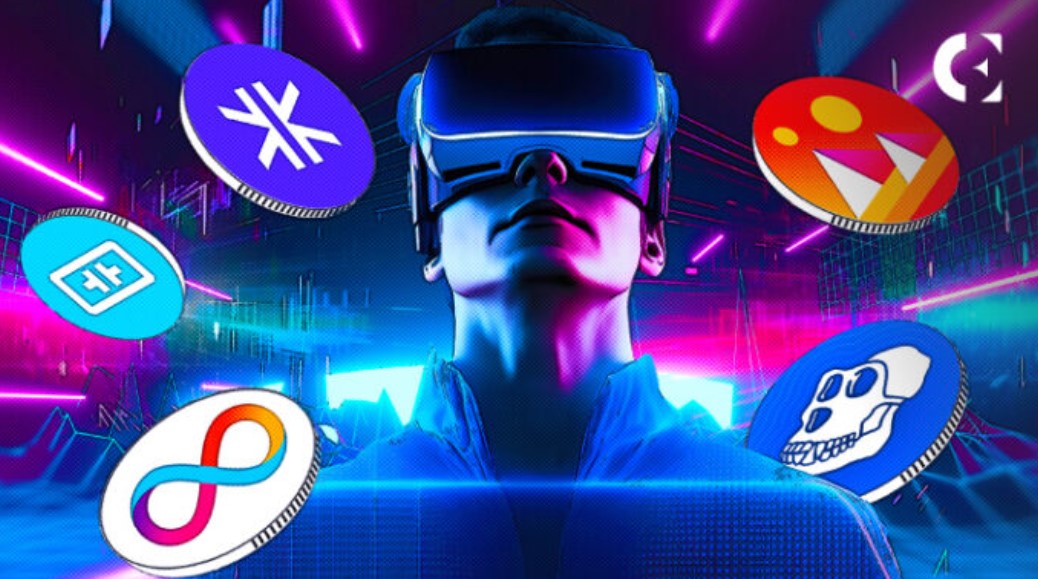Embark on an in-depth journey to learn about the revolutionary transformation of online gambling with Metaverse cryptocurrencies. Understand the superior alternatives for crypto transactions within the Metaverse and learn where to acquire them.
The Metaverse and Cryptocurrency
As the Metaverse continues to evolve at breakneck speed, it becomes crucial to comprehend its potential impact on online transactions, particularly in gambling. Cryptocurrency plays a pivotal role in this digital evolution, with decentralized casinos set to usher in a new era of Metaverse gambling.

metaverse crypto
The Metaverse, the next frontier of the internet, is powered by blockchain technology, the backbone of cryptocurrency. Transactions within the Metaverse, such as buying Non-Fungible Tokens (NFTs) for avatar customization or making deposits at Metaverse casinos, are powered by crypto tokens.
In a nutshell, the Metaverse’s transactions are protected and swift, adding to the allure of this futuristic concept. Businesses worldwide are increasingly recognizing the utility of crypto tokens as a legitimate payment method.
Best Metaverse Crypto for Virtual Gambling
The Metaverse embraces cryptocurrencies that millions of individuals already use. These digital currencies are likely to maintain their value in the Metaverse’s simulated environment, facilitating online gambling. Consider the following top cryptocurrencies for the Metaverse:
Bitcoin
Bitcoin, the original cryptocurrency, remains the most widely circulated. Launched in 2008 by the elusive Satoshi Nakamoto, Bitcoin’s price fluctuates between $30,000 to $60,000 due to market variations. Besides being a lucrative investment, Bitcoin is a popular daily currency for online transactions, including online gambling.
BitcoinCash
BitcoinCash, established in 2017, is a spin-off from Bitcoin. Featuring larger block sizes, BitcoinCash processes transactions faster than Bitcoin, making it a more economical alternative. It’s gaining popularity among users due to reduced transaction times and lower fees.
Ethereum
Ethereum, the second most traded cryptocurrency, stands out with its smart contract capabilities. It’s the primary blockchain choice for the creation of tokens, coins, and NFTs. Ethereum is actively working on a more sustainable cryptocurrency structure, moving to a proof-of-stake model, significantly reducing energy consumption and ensuring faster transactions.
Litecoin
Litecoin, launched in 2011, was built on Bitcoin’s foundation but optimized for speed and efficiency. It’s known for its rapid transaction processing and increased market cap, making it a preferred choice for online transactions.
Dogecoin
Dogecoin began as an internet meme and morphed into a recognized cryptocurrency. Despite its humorous origins, Dogecoin has become a preferred payment method online and is accepted by some gambling sites.The following table provides a concise overview of these cryptocurrencies:
| Crypto | Ticker | Creation Date | Market Share | Average Transaction Time |
| Bitcoin | BTC | 2008 | 42% | 60 minutes |
| BitcoinCash | BCH | 2017 | 0.3% | 60 minutes |
| Ethereum | ETH | 2013 | 18% | 6 minutes |
| Litecoin | LTC | 2011 | 0.4% | 30 minutes |
| Dogecoin | DOGE | 2013 | 1% | 40 minutes |
Why You Need a Metaverse Crypto Wallet
Metaverse gambling offers a decentralized and creatively vibrant environment for players. It eliminates regulatory fees and unleashes a plethora of tokens and NFT collections. But where do crypto wallets fit into this ecosystem? Well, think of them as your virtual warehouses, safeguarding your precious coins and NFTs. Just like gamers covet the Serenity Island token in Lost Ark, gamblers cherish their freshly minted NFTs. Additionally, crypto wallets act as a form of identification in the metaverse, enabling you to track the ownership of NFTs.

metaverse crypto coins
How Do Crypto Wallets Work?
Let’s demystify the workings of crypto wallets. Contrary to their name, they don’t physically store coins or exist as tangible objects. Instead, they are software programs running on your computer, mobile, or tablet. The cryptocurrencies you own are stored as data on the blockchain, and your wallet connects to this data, associating it with your wallet address. In simple terms, your wallet provides you with cryptographic control over your assets. However, it’s vital to understand that each crypto wallet has two keys—public and private.

crypto metaverse
The public key acts as a more intricate bank account number and is visible to everyone. It is used by others to send you crypto or sell you NFTs. On the other hand, the private key is known only to you, the wallet user. Guarding this key is crucial, as anyone who gains access to it can empty your wallet in an instant. Unfortunately, human error remains a weak point in any security system.
Types of Crypto Wallets for Metaverse Gambling
Now, let’s explore the different types of crypto wallets available for metaverse gambling. Experts often categorize wallets based on their internet connectivity and custodial status.
Hot vs. Cold Wallets
Hot wallets are connected to the internet, providing convenient usage but making them vulnerable to malware and social engineering attacks. Cold wallets, on the other hand, remain offline until connected, offering enhanced security by avoiding constant exposure to potential threats.
Custodial vs. Non-Custodial Wallets
Custodial wallets are provided by third-party services that also safeguard your keys. They are commonly used by large organizations due to their convenience. Non-custodial wallets, such as those installed on your phone or PC, grant you full control and responsibility over your keys.
Software Wallets and Hardware Wallets
Software wallets, accessible via apps or websites, are popular hot wallet options. They offer integration with exchanges, allowing easy money transfers. Hardware wallets, resembling USB sticks, provide enhanced security by remaining offline until connected. While hardware wallets offer heightened protection, software wallets have become increasingly secure and convenient.
The Best Crypto Wallets for Metaverse Gambling
After extensive testing, and consultations with players, NFT collectors, and experts, we have identified the top crypto wallets for metaverse gambling. These wallets have emerged as champions, combining security, functionality, and user experience:
MetaMask
MetaMask, developed by ConsenSys, stands out as the best option for metaverse casino enthusiasts. It allows the creation of multiple wallet addresses, making it ideal for storing casino NFTs and coins from play-to-earn games. With MetaMask, you can seamlessly manage your digital assets within the metaverse, without the need for constant switching. It also offers easy exploration of dApps on the Ethereum blockchain.
Math Wallet
Similar to MetaMask, Math Wallet boasts excellent blockchain support, accommodating over 60 different chains. As metaverse casinos and new utility coins continue to emerge, Math Wallet is well-positioned to adapt. It provides the convenience of staking directly from its extension, along with a rewarding program that enhances math mining power.
Coinbase
As one of the most accessible crypto wallets, Coinbase leverages the reputation and security protocols of its associated exchange. It ensures the safety of your assets and enables the connection of hardware wallets. Coinbase Wallet also offers the convenience of storing fiat currencies alongside your NFTs and coins.
AlphaWallet
AlphaWallet goes beyond a standard hot wallet by providing off-chain solutions. Leveraging Apple’s Secure Enclave technology, it reduces resource consumption by dApps and enhances the overall user experience. In addition to securely housing NFTs and Ethereum-based coins, AlphaWallet collaborates with companies to tokenize various assets, further expanding its functionality.
Enjin Wallet
Enjin Wallet stands out for its abundance of features. It allows infinite wallet creation, supports multiple wallet types, and offers robust security measures. With Enjin Wallet, you can easily customize and manage your personal finances. Its proprietary keyboard mitigates keylogging risks, and a 12-word master password ensures swift recovery of funds in case of device loss.

what is metaverse crypto
How to Buy Crypto for Metaverse Gambling
Once you have selected the ideal crypto wallet to safeguard your assets, it’s time to fill it with coins. Here’s a simple guide to purchasing cryptocurrencies:
- Create a crypto wallet: Choose one of our recommended wallets or explore new options that suit your needs.
- Purchase coins at a crypto exchange: Many exchanges now offer integrated wallets. If you opt for such an exchange, you can skip creating an additional account. Otherwise, follow the instructions provided and connect your preferred payment method.
- Wait for the funds to land: Depending on the protocol, the transaction may take a few minutes. Refresh your wallet to ensure your newly acquired cryptocurrencies appear.
- Enter a metaverse casino and enjoy: Now that you have your wallet funded, embark on your metaverse gambling adventure. Prioritize research on the casino and its games to maximize your chances of success. Remember, a little preparation can go a long way.
Metaverse Tokens vs. Cryptocurrencies
The primary distinction between Metaverse tokens and cryptocurrencies is their function. Cryptocurrencies serve as a medium of exchange, store of value, and unit of account, similar to traditional fiat currencies. On the other hand, tokens can represent a multitude of digital assets and rights within the Metaverse.
Both tokens and cryptocurrencies have their roles within the Metaverse, contributing to the creation of a robust digital economy. As these virtual worlds continue to evolve, the ways in which tokens and cryptocurrencies are used and interact with each other are likely to become more complex and nuanced.
It’s also worth noting that the value of these tokens and cryptocurrencies can fluctuate, similar to real-world assets and currencies. Therefore, whether you’re buying a Metaverse token or investing in a Metaverse cryptocurrency, it’s important to do your research and understand the risks associated with these digital assets.
The Metaverse Tokens and Their Apps
The Metaverse, a thriving digital ecosystem, operates on specific tokens that are integral to various virtual platforms. Here’s a look at some of the significant tokens and their applications:
- Decentraland (MANA Token): This platform leverages the power of blockchain to provide users with a decentralized virtual reality environment. Users can create, explore, and trade within this universe using MANA tokens.
- Decentral Games ($DG Tokens): Decentral Games is the gambling section of Decentraland, offering a range of casino-style games. The currency used here is the $DG token.
- EarnBet.io (BET Tokens): EarnBet.io is an online betting platform that allows users to place bets using BET tokens.
- The Sandbox (SAND Tokens): The Sandbox is a virtual world where players can build, own, and monetize their gaming experiences on the Ethereum blockchain using SAND tokens.
- Atari ($ATRI Tokens): Atari, a pioneer in interactive entertainment, is carving its niche in the Metaverse with a virtual casino that will run on $ATRI tokens.

decentraland mana
Further, notable tokens include:
- Axie Infinity (AXS): Axie Infinity is a Pokemon-inspired digital pet universe with a player economy where users employ the AXS token.
- Illuvium (ILV): Illuvium is an open-world RPG adventure game built on the Ethereum blockchain. ILV tokens are at the core of its economy.
- Vulcan Forged PYR (PYR): Vulcan Forged PYR is a gaming ecosystem where PYR tokens are used for gaming and staking.
- Mines of Darlania (DAR): In the Mines of Darlania, players use DAR tokens to participate in this blockchain-based DeFi game.
- High Street (HIGH): High Street is a next-gen decentralized Metaverse marketplace that operates on the HIGH token.
While this list provides insight into the role of tokens in the Metaverse, it’s crucial to perform due diligence and understand the potential risks before engaging with these digital assets.
Conclusion
As we delve deeper into the digital age, cryptocurrencies are poised to play a significant role in the Metaverse, the next frontier of online interaction. Virtual tokens enable economic transactions, create ownership rights, and establish a unique economy within these digital realms. Platforms such as Decentraland, The Sandbox, and Illuvium, among others, are leading the charge with proprietary tokens powering unique gaming and interactive experiences.However, with this new wave of digital innovation comes a fair share of risks and challenges. Cybersecurity, regulatory issues, and volatility inherent to cryptocurrencies are among the key concerns. Despite these, the potential of a crypto-powered Metaverse is immense, inviting a future where the line between physical and virtual financial transactions blurs.
FAQs
Why do I need a crypto wallet for metaverse gambling?
Crypto wallets serve as virtual storage for your valuable coins and NFTs, ensuring their safety and providing a form of identification in the metaverse.
How do crypto wallets work for metaverse gambling?
Crypto wallets are software programs that connect to the blockchain, where your assets are stored as data. They give you cryptographic control over your coins and NFTs, utilizing public and private keys.
Which crypto wallets are recommended for metaverse gambling?
The top choices for metaverse gambling include MetaMask, Math Wallet, Coinbase, AlphaWallet, and Enjin Wallet. These wallets offer a combination of security, functionality, and user experience.
What is a Metaverse Token?
Metaverse tokens are specific digital currencies used within particular virtual spaces or platforms in the Metaverse. They serve as the medium of exchange for goods, services, or assets within that specific Metaverse environment.
What is the difference between Metaverse Tokens and Cryptocurrencies?
While Metaverse tokens and cryptocurrencies operate on similar blockchain principles, the main difference lies in their scope of use. Cryptocurrencies like Bitcoin and Ethereum aim to serve as a universal digital currency. On the other hand, Metaverse tokens such as MANA (Decentraland) or SAND (The Sandbox) are primarily used within their respective Metaverse platforms.




